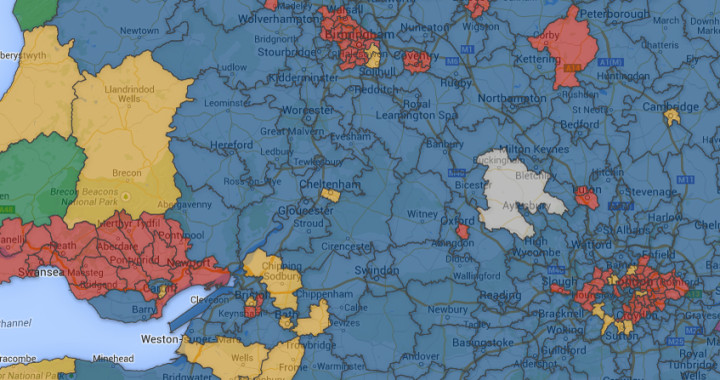Introducing the Democratic Dashboard: a new voter information resource
Today Democratic Audit UK presents the Democratic Dashboard, a new voter information resource which for the first time brings together an array of information on different types of elections and constituencies, and aims to make often difficult to find data more widely accessible. The UK has the lowest rate of electoral participation by young people in the OECD, and we hope to play a part in using the digital environment to spread engagement, writes Carl Cullinane.
The Democratic Dashboard is launched at a particularly crucial juncture for British electoral politics. During the term of this parliament, a disillusioned and and frequently disengaged electorate has found invigoration mainly outside the traditional Big Three parties, and the structure of party politics is on the brink of radical change. Britain is moving ever closer to multi-party politics, and the Dashboard’s data demonstrates how this has happened since 2010, at a seat-by-seat level, with the SNP, the Greens and UKIP all making significant progress in certain geographical areas.
The very nature of First Past the Post elections puts an emphasis on local factors, and with the increasing complexity of local battlegrounds, voter information is more relevant than ever. However, on the other hand, as younger generations become increasingly geographically mobile, people are less tied to their local areas and may not have the knowledge of their area as long-standing residents. Furthermore, they often face confusing and contradictory messages through the door on which candidates are and aren’t “competitive”. This is where the Dashboard (hopefully) comes in, providing an independent resource on what’s been happening in constituencies since 2010 and offering context to the choices faced by the electorate on the 7th of May.
The Dashboard also seeks to illuminate national issues, through the local. There are drastic differences in the demographic and social makeup of constituencies across the UK, shaping, and shaped by their relationship with the political process. 395 constituencies have had all male, all white MPs since 1992, and 268 haven’t seen a female MP, a non-white MP, nor a change in party over the last twenty five years. In some seats, a large majority of the electorate lives in areas of deprivation, others contain practically none. Health, a major issue in this election, also varies drastically between constituencies.
As highlighted by the Voter Power Index, and the Index of Local Disproportionality the voting system is also a highly unequal one. Voters in permanently safe seats (388 seats have not changed party hands since 1992) have a fraction of the potential influence of voters in marginal constituencies. To take an example, on Merseyside alone a vote in Wirral South is worth effectively 185 votes in Liverpool Walton. The pattern of money spent in order to secure people’s votes bears this inequality out.
In highlighting these issues through data, along with making that data available, we hope that the Dashboard will be a useful tool for those wanting to know more about their locality, along with journalists, researchers and citizen social scientists alike. The data will be made available in full shortly and we encourage people to make full and innovative use of it.
Please excuse any gremlins in the site as we bed it in, we will be developing it further over the coming weeks, and are very excited to play a part in what promises to be a fascinating, and I’m sure exhausting, election.
—
Click here to visit the Democratic Dashboard.
This post represents the views of the author and not those of Democratic Audit or the LSE. Please read our comments policy before posting.
—
 Carl Cullinane is Research Assistant at the Democratic Audit, and is responsible for conducting in-house research along with heading up the Audit’s Democratic Dashboard project and contributing to the blog and other DA outputs. He holds a degree in Philosophy and Political Science from Trinity College Dublin, along with MSc’s in Philosophy & Public Policy from the LSE and Applied Social Research, also from Trinity College.
Carl Cullinane is Research Assistant at the Democratic Audit, and is responsible for conducting in-house research along with heading up the Audit’s Democratic Dashboard project and contributing to the blog and other DA outputs. He holds a degree in Philosophy and Political Science from Trinity College Dublin, along with MSc’s in Philosophy & Public Policy from the LSE and Applied Social Research, also from Trinity College.
He has worked for the Irish Ombudsman for Children, the Economic and Social Research Institute, and NatCen Social Research, joining the Democratic Audit in Summer 2014. He can be found on twitter at @cullinanecarl






 Democratic Audit's core funding is provided by the Joseph Rowntree Charitable Trust. Additional funding is provided by the London School of Economics.
Democratic Audit's core funding is provided by the Joseph Rowntree Charitable Trust. Additional funding is provided by the London School of Economics.
Introducing https://t.co/iqfS4XD7Xs A vital new voter information resource for your area, wherever you are in the UK https://t.co/J3H7H6IiQX
Social science for the public good: new Democratic Dashboard website gives UK voters huge local information to vote https://t.co/qoDLHsXPyr
Introducing the Democratic Dashboard: a new voter information resource https://t.co/VFqPVZ9ijg
Introducing the Democratic Dashboard: a new resource to improve voter information https://t.co/D2rsGWT5lp
Introducing the Democratic Dashboard: a new resource to improve voter information https://t.co/oZ2oYxzBeS